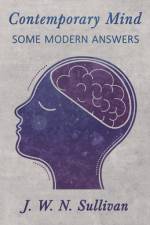av J. W. N. Sullivan
307
¿Contemporary Mind - Some Modern Answers¿ is a fantastic collection of essays by English science writer John W. Sullivan. They deal with a range of subjects, ranging from mysticism and immortality to the relationship between science and art. John William Navin Sullivan (1886 ¿ 1937) was a literary journalist and popular science writer most famous for his study of Beethoven. He is also responsible for having written some of the earliest non-technical accounts of Einstein¿s General Theory of Relativity, and he was acquainted with many important writers in London in the 1920s, including John Middleton Murry, Aldous Huxley, Wyndham Lewis, Aleister Crowley and T. S. Eliot. Other notable works by this author include ¿Aspects of Science¿ (1923), ¿Aspects of Science: Second Series¿ (1926), and An Outline of Modern Knowledge (1931). Contents include: ¿The Balanced Life¿, ¿The Problem of Suffering¿, ¿The Necessity of Mysticism¿, ¿Human Immortality¿, ¿A Dissertation on Beethoven¿, ¿The Scientific Outlook¿, ¿A Dissertation on Maxwell¿, ¿New Principles¿, ¿A Dissertation on Newton¿, ¿Science and Art¿, ¿Mathematics and Culture¿, ¿Sir Josiah Stamp¿, ¿Mr. Aldous Huxley¿, etc. Many vintage books such as this are increasingly scarce and expensive. It is with this in mind that we are republishing this volume now in an affordable, modern, high-quality edition complete with the original text and artwork.







